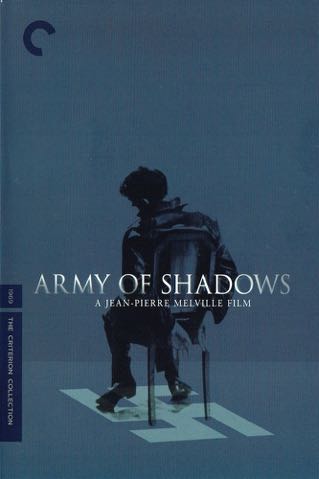General Details

Director: Jean-Pierre Melville
Writer: Joseph Kessel, Jean-Pierre Melville
Producer: Jacques Dorfmann
Theatrical: 1969
Rated: Not Rated
Studio: Criterion Collection
Genre: Art House & International
Duration: 145
Media: Digital
Collection ID: 1387
Summary
Who would've guessed that the best film of 2006 would be a 37-year-old thriller about the French Resistance during World War II? Hailed as a masterpiece by an overwhelming majority of reputable critics, Jean-Pierre Melville's "Army of Shadows" wasn't officially released in America until 2006 (hence its appearance on many of that year's top-ten lists), but its reputation as a French classic was already well-established throughout Europe. Fully restored in 2004 and released in the U.S. by Rialto Pictures, it represents the gold standard of films about the French Resistance, based upon Joseph Kessel's 1943 novel and imbued with personal touches by Melville, an Alsatian Jew whose own involvement in the Resistance qualifies "Army of Shadows" as a semi-autobiographical exercise in somber nostalgia, as indicated by an opening quote echoing Melville's ironic belief that memories of Nazi occupation needn't always be traumatic.
Having lived through this history, Melville doesn't treat it lightly; in "Army of Shadows", the threat of death hangs over every scene like a shroud. Unfolding with flawless precision, the plot begins in 1942 and focuses on a small, secretive band of Resistance fighters led by Gerbier (Lino Ventura), whose intuitive sense of danger lends additional suspense to the film's dark, atmospheric study of grace under pressure. While working in the classical tradition of the Hollywood films he admired, Melville breaks from convention with lengthy, deliberately paced scenes in which tension builds to a subtle yet almost unbearable intensity. With the possible exception of a brief and wryly humorous scene involving Resistance leader (and future Prime Minister) Gen. Charles de Gaulle, every scene in "Army of Shadows" supports Melville's predominant themes of solitude and futility. Melville's visually and thematically bleak outlook may prove challenging for some, but "Army of Shadows" is remarkably beautiful in its own way, and it gains power with each additional viewing through flawless development of memorable characters played by a first-rate cast. Especially memorable is Simone Signoret as Gerbier's boldly pragmatic ally Mathilde, a woman in a war of men, with a tragic vulnerability that ultimately decides her fate. As intellectually stimulating as it is thrilling to experience, "Army of Shadows" represents the triumphant zenith of Melville's posthumous recognition as a world-class auteur. Thanks to the Criterion Collection, this masterpiece can now be widely appreciated, along with Criterion's previous DVD releases of Melville's earlier classics "Bob Le Flambeur", "Le Samourai", and "Le Cercle Rouge". "--Jeff Shannon"
On the DVDs
On disc 1 in this superior two-disc set, the meticulous 2004 restoration of "Army of Shadows" is presented in a new high-definition digital transfer supervised by cinematographer Pierre Lhomme. The audio commentary by French film historian Ginette Vincendeau is one of Criterion's finest to date; Vincendeau's scholarship is impeccable, her thematic observations are eloquently expressed, and her knowledge of French cinema is impressively thorough, placing "Army of Shadows" in a rich context of other films about the French Resistance. The supplements on disc 2 maintain Criterion's highest standards of archival research, beginning with "Jean-Pierre Melville: Filmmaker," a four-minute French TV news segment from 1968, in which Melville discusses the production of "Army of Shadows". A new 2006 interview with cinematographer Pierre Lhomme (14:00) is accompanied by a restoration demonstration (7:10) and color-tone reference photos used during the restoration process. Also included is an 11-minute interview (also from 2006) with editor Françoise Bonnot.
A half-hour segment of the French TV show "L'invite du dimanche", from March 1969, features behind-the scenes production footage and fascinating interviews with Melville, the primary cast of "Army of Shadows", novelist Joseph Kessell, and French Resistance fighter André Dewavrin (whom Melville recruited to play Colonel Passy in "Army of Shadows"). "Melville et 'L'Armée Des Ombres'" ("Melville and "Army of Shadows") is an excellent half-hour documentary featuring interviews of many of Melville's contemporaries (including director Bertrand Tavernier) sharing insights and anecdotes in an in-depth appreciation of Melville and "Army of Shadows". A superb section devoted to the French Resistance includes "Le Journal de la Resistance," a riveting 33-minute documentary filmed in Paris in August 1944 (and narrated by Noel Coward), just as the final French insurrection and pending arrival of U.S. liberation troops were leading to Nazi surrender and massive celebration in the streets of Paris. A five-minute TV interview segment, from 1984, features Simone Signoret paying tribute to Lucie Aubrac, a Resistance fighter (also interviewed) who was a key inspiration for Signoret's character in "Army of Shadows". Finally, disc 2 closes with a 23-minute excerpt from a 1973 episode of the French TV show "Ouvrez les guillemets", in which several former members of the French Resistance discuss their clandestine activities during the Nazi occupation of France from 1940 to 1944. "--Jeff Shannon"

